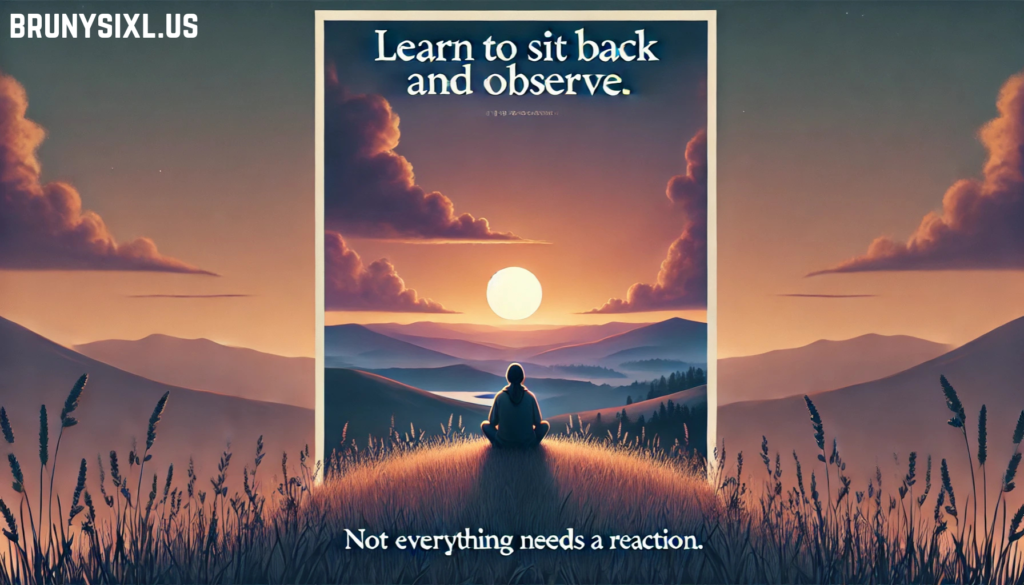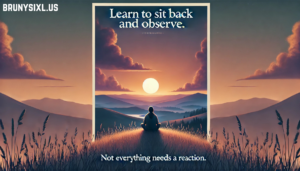
Introduction: The Power of Observation in a World of Constant Action
In today’s fast-paced, always-connected world, we’re often conditioned to respond to everything around us—immediately. Whether it’s work, relationships, or social media, there’s constant pressure to engage. But what if the secret to a more peaceful, productive life was simply learning to sit back and observe? What if you didn’t need to react to every situation? That’s where the concept of “Not Everything Need – Tymoff” comes in.
This approach encourages us to take a step back, avoid impulsive reactions, and adopt a more thoughtful, intentional mindset. By mastering the art of observing, we can make more informed decisions, reduce stress, and improve our emotional well-being. Let’s dive deeper into this mindset and explore how it can change the way you navigate your daily life.
Why Learning to Sit Back and Observe Matters
The Importance of Observation Over Reactivity
In a world where information overload is the norm, it’s easy to feel like you need to act immediately. But rushing into reactions often leads to mistakes, emotional burnout, and unnecessary stress. Instead, the practice of sitting back and observing allows you to gather information and analyze the situation before jumping to conclusions.
The benefits of this approach include:
- Better Decision-Making: When you take time to observe, you make choices based on facts and deeper understanding, not impulsive emotions.
- Reduced Stress: Stepping back creates space between a stimulus and your response, which can reduce anxiety and help you remain calm under pressure.
- Improved Relationships: By not reacting to every little comment or situation, you cultivate a more thoughtful and respectful approach in your interactions with others.
The Role of “Not Everything Need – Tymoff” in Your Life
The idea of “Not Everything Need – Tymoff” emphasizes that not every situation requires your energy, focus, or response. This is especially important in an age where social media and technology demand constant attention. By applying this principle, you choose when to engage and when to let things pass without unnecessary involvement.
Example: On social media, you don’t have to respond to every post or comment, especially when it doesn’t align with your values. Instead of getting caught up in every conversation, you can choose to observe and engage only when necessary.
How to Master the Art of Sitting Back and Observing
Step 1: Cultivate Mindfulness
Mindfulness is a key component of learning to observe instead of reacting. It allows you to be present in the moment, aware of your thoughts and emotions without judgment. Practicing mindfulness helps you create the mental space necessary to make thoughtful decisions rather than impulsive reactions.
Actionable Tip: Try a simple mindfulness exercise like focusing on your breath for five minutes each day. This practice will help you develop a habit of pausing before reacting.
Step 2: Practice the Pause
When faced with a challenging situation, pause before acting. This pause helps you process the information, check in with your emotions, and decide whether a response is truly necessary.
Actionable Tip: The next time you receive a work email that irks you or encounter a stressful situation, take a moment to breathe. Count to 10 slowly before responding. This brief moment of reflection can drastically change the outcome of the situation.
Step 3: Learn to Prioritize Your Energy
You only have so much mental and emotional energy in a day. Learning to prioritize where you invest your time and energy is essential to maintaining balance. Not every request or situation requires your attention. “Not Everything Need – Tymoff” teaches you to assess what truly matters and where your energy is best spent.
Actionable Tip: At the start of your day, list your top three priorities. Anything outside of that list can be observed, but not necessarily engaged with immediately. This practice helps you stay focused on what really counts.
The Psychological Benefits of Observing More and Reacting Less
Lowering Stress and Anxiety
By choosing to observe instead of react, you gain control over your emotions. Reacting impulsively can often lead to feelings of regret or anxiety, especially in situations where emotions are high. Taking a moment to reflect reduces the chances of regrettable reactions.
Example: In a heated argument, choosing to sit back and observe can prevent you from saying something you’ll regret. You allow both yourself and the other person time to reflect, leading to a calmer resolution.
Building Emotional Intelligence
When you sit back and observe, you’re not just analyzing the situation—you’re also becoming more attuned to your own emotional state. This practice builds emotional intelligence, allowing you to understand your feelings, regulate your emotions, and react with clarity and empathy.
Actionable Tip: When faced with conflict, instead of jumping in with your own opinion, take time to reflect on how the other person might be feeling. This creates empathy and leads to more harmonious interactions.
Enhancing Decision-Making Skills
When you’re not reacting impulsively, you give yourself the opportunity to make more informed and rational decisions. This is particularly valuable in work environments, personal relationships, and when facing difficult choices.
Example: In the workplace, instead of immediately reacting to every challenge, observe the situation and weigh the pros and cons. This more thoughtful approach leads to decisions that benefit everyone involved.
Practical Ways to Implement “Not Everything Need – Tymoff”
Set Boundaries and Limit Distractions
In a world filled with constant notifications, it’s crucial to set boundaries. Recognize when something doesn’t require your immediate attention and remove distractions from your environment. This helps you focus on what’s important without feeling overwhelmed by everything else.
Actionable Tip: Use tools like “Do Not Disturb” on your phone or set designated times for checking emails. Limit your exposure to unnecessary distractions that don’t align with your goals.
Learn to Say No Without Guilt
Not every request or invitation requires a “yes.” Learning to say no is an important part of managing your time and energy. Saying no gives you the space to observe, reflect, and focus on your top priorities.
Actionable Tip: Practice saying no in small situations. Start by declining an invitation or turning down a meeting that doesn’t align with your priorities. The more you practice, the easier it will become to protect your energy.
Let Go of Perfectionism
Not everything needs to be perfect or resolved immediately. Sometimes, stepping back and letting things unfold naturally is the best course of action. Accept that some things are beyond your control and that it’s okay to let go.
Actionable Tip: The next time you feel pressured to solve a problem immediately, take a breath and ask yourself, “Is this really urgent?” Sometimes, the best response is no response at all.
Conclusion: Embrace the Power of Observation and Mindful Engagement
In a world that constantly demands your attention, learning to sit back and observe is a powerful tool for managing your time, energy, and emotional well-being. The principle of “Not Everything Need – Tymoff” encourages you to choose when and how you engage, leading to more thoughtful responses and better decisions.
By adopting mindfulness, pausing before acting, and setting healthy boundaries, you can navigate life’s challenges with greater clarity and peace. Remember, not every situation requires your immediate response, and sometimes, the most powerful choice is to sit back and observe.
Start practicing this mindset today, and notice how your stress levels decrease, your decision-making improves, and your relationships become more intentional. Embrace the power of sitting back and observing—because not everything needs your attention.







